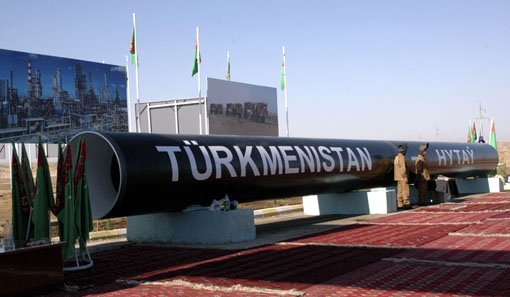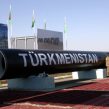
Turkmen Energy Initiatives Cripple Russia’s Status as an “Energy Superpower”
Publication: Eurasia Daily Monitor Volume: 7 Issue: 213
By:

A few years ago it was common to refer to Russia as an “Energy Superpower.” High global energy prices prior to the global financial crisis and Russia’s control over Central Asian oil and gas exports underscored the seemingly irrefutable proposition of Moscow’s influence. Yet, this assertion is becoming increasingly anachronistic, despite the strong authority that Russia is likely to command as an energy power for the foreseeable future. This is most evident in Central Asia, where Turkmenistan, Kazakhstan, and Uzbekistan are steadily ending Moscow’s near dominance over regional energy exports and its “energy superpower” status.
Turkmenistan’s energy exports diversification policy alone is especially undermining Russian energy dominance. Turkmenistan possesses some of the world’s largest gas deposits. Its proven gas reserves are estimated at 24.6 trillion cubic meters (tcm), making it fourth after Russia, Iran and Qatar in terms of the largest gas reserves. Ashgabat plans to produce and export 250 and 180 billion cubic meters (bcm) of gas respectively by 2030, while striving to lessen its dependence on Russia for energy exports (www.bfm.ru, October 23; www.ng.ru, October 15; www.chrono-tm.org, October 28).
Turkmenistan currently exports 10 bcm of gas to Russia, an almost fourfold decline from earlier levels. This downturn stems from the aftermath of the explosion on a gas pipeline delivering Turkmen gas to Russia in 2009 and lower European demand for gas amidst the global financial crisis: Turkmenistan lost billions of dollars as result. Turkmen-Russian relations have also become strained, forcing Turkmenistan to more actively pursue diversified export routes (www.rus.azattyq.org, October 1).
Today, Ashgabat sells 10-12 bcm of gas to China via the world’s largest and newly constructed gas pipeline. With its annual capacity of 40 bcm, the pipeline stretches from Turkmenistan across Uzbekistan and Kazakhstan to China. It also exports 20.5 bcm to Iran, which became possible after the construction of the second pipeline earlier this year (www.rus.azattyq.org, October 1; www.smi.ru, October 22). Turkmenistan has also called for establishing an international mechanism within the UN to ensure stable cross-border energy supplies and security (www.en.rian.ru, September 29; www.ng.ru, October 15). Ashgabat recently intensified its efforts to advance the Turkmenistan-Afghanistan-Pakistan-India (TAPI) and Nabucco gas pipeline projects with an annual capacity of 31 and 33 bcm, respectively. Bypassing Russia, these pipelines would link Central Asia with South Asia and Europe.
Moscow’s efforts to discourage Turkmen participation in the TAPI and Nabucco initiatives after the explosion incident have not produced any breakthrough. Russian Deputy Prime Minister, Igor Sechin, reportedly stated that the visit to Turkmenistan in October by the Russian President, Dmitry Medvedev, secured an agreement to postpone the construction of the gas pipeline along the Caspian coast due to low gas demand in the EU (www.evrazia.org, October 29). The pipeline is intended to deliver Turkmen and Kazakh gas to Europe through Russia.
Sechin also reportedly said that Moscow and Ashgabat were exploring the possibility of Russian participation in the TAPI project (www.inosmi.ru, October 30). Sechin further downgraded the prospects for Nabucco, the rival of Moscow’s South Stream project. “Given the estimates of the Turkmen side, as well as European and international experts, the current market situation on the gas track allows us to say –and I say so without sarcasm– that there are no prospects for Nabucco,” Sechin stated (www.bfm.ru, October 23).
The reaction of the Turkmen foreign ministry was unambiguous to the related reports in the Russian media: “Such information has no grounds…the published statements are treated in Turkmenistan as an attempt to hinder the good course of international collaboration of our country in the energy sphere and cast doubt on commitments to our partners.” The Turkmen foreign ministry statement added that no agreements concerning the participation of Russian companies in the TAPI project exist and concluded: “Turkmenistan hopes that official personalities in Russia will be guided by a sense of responsibility and realism in their future statements” (www.turkmenembassy.ru).
Turkmen Vice-Prime Minister, Baimurad Khodzhamuhamedov, stressed that the country would have enough gas to export to the EU (www.rus.ruvr.ru, November 11). Turkmenistan is already building a pipeline, with an annual capacity of 30 bcm, connecting the country’s north-eastern gas deposits with the Caspian Sea, which could facilitate its future gas exports to Europe (www.gundogar.org, November 28).
Yet, some experts are skeptical about TAPI, Nabucco, and Turkmenistan’s role. They argue that Russian pressure, alternative pipelines, difficulties in Turkmen-Azeri relations, financial constraints, and the unresolved status of the Caspian Sea (shared by Russia, Iran, Kazakhstan, Turkmenistan, and Azerbaijan) render Nabucco as an unrealistic initiative (www.news.finance.ua/ru, October 28; www.bfm.ru, October 23; www.rus.ruvr.ru, October 21). Equally, according to such an argument, instability in Afghanistan and tense Indian-Pakistani relations make TAPI wishful thinking (www.rus.ruvr.ru, November 11; www.inosmi.ru, October 30).
Still, others believe that these projects have good prospects. Further improvement of Turkmen-Azeri relations is not inconceivable given the countries’ national interests in exporting gas directly to Europe. Shipping Turkmen gas across the Caspian Sea is also a possibility, though not without its difficulties (www.news.finance.ua/ru, October 28; www.smi.ru, October 22; www.ng.ru, October 15). Strong backing by the EU and the US, interested in the diversification of energy routes in Eurasia, could also facilitate the implementation of both projects (www.inosmi.ru, October 30; www.regnum.ru, November 25).
As for the TAPI project, the pipeline may generate financial and peace dividends for Afghanistan, India, Pakistan, and the wider region (www.gundogar.org, November 28; www.inosmi.ru, October 30). New Delhi and Islamabad would also diversify their sources of energy imports as they meet their growing energy needs, while Kabul could strengthen the country’s economic development. Possible TAPI extensions to the Gwadar port in Pakistan may further entail energy exports to the EU and elsewhere (www.inosmi.ru, October 30).
Regardless of whether Nabucco and TAPI materialize, it is clear that Russian control over Central Asian energy exports is receding. The new pipelines linking Central Asia with Iran and China have already undermined Moscow’s energy ambitions in the post-Soviet space, redrawing the Eurasian energy map and crippling the frequently alleged status of Russia as an “energy superpower.” It remains to be seen whether TAPI and Nabucco will reshape the energy and geopolitical realities in Eurasia even further.




